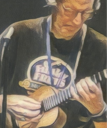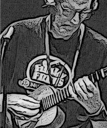Learning Ukulele with Curt
The Study of Music Today
Many people feel that they cannot begin music after a certain age. This is a common myth. Age proves no obstacle to the enjoyable pursuit of music.
There is a lot of information available that is just wrong, so try to consult a legit expert on the subject. Don’t assume that the information is correct because it’s in a magazine or on-line. Magazines are notorious for featuring well-known players who can’t teach. They often have a very fuzzy idea of what they’re doing and what to call specific scales, chords, and techniques.– Chuck Anderson
Beginning Music
Many people feel that they cannot begin music after a certain age. This is a common myth. Age proves no obstacle to the enjoyable pursuit of music. The mature person has a better sense of his or her needs, makes better use of time, and understands the value and need for self-expression.
The Ukulele is the perfect for beginning at any stage in you life.
Practice Time
It is commonly thought that the study of music requires hours a day of boring practice. Rather than long, tedious practice, what is needed is a very efficient and interesting lesson plan in which students can develop their musical ability within the framework of their own available time.
It, actually, simply comes down to doing the WORK!!! — Putting in the time — quality time.
Leisure Time
How does anyone spend their leisure time? There is certainly no shortage of alternatives. The experience of music is a most satisfying pastime. It grows even more satisfying as students begin to develop their ability to play.
Creative Capacity
Since music provides an opportunity to develop one's creative capacities, it should be part of everyone's educational experience. The concentration and discipline developed through the study of music is particularly valuable to children or adults who have never been exposed to creative music in the traditional school setting.
Bridge to the Generation Gap
Music, so popular with youth, is an excellent bridge to the so-called
generation gap. Music favors neither male nor female, adult or child. It provides a unique opportunity for communication between parents and children. Though few take advantage of it, participation in music is one of the finest possible family activities.
The Study of Music Today
Few people are aware of the many new developments in music education today. It is quite common to identify music lessons with the boring and repetitive exercises of many years ago. In contrast to this, our approach and material are uniquely suited to the needs of the contemporary student.
Relaxation with Music
Anyone who has accepted responsibility in life has unavoidable pressure. It is most necessary to have a way to relax from the pressures of daily life. Music, with its emphasis on the relaxed exploration of sound, provides an excellent opportunity to escape from the tension and pressures of daily responsibility.
Thanks to Chuck Anderson for permission to use the above copy with a few of Curt's additions.
Here are two PDF flyers for download that I have as handouts for potential students and their parents. These have been very successful with new students.
Modular Phonetic Rhythm – Chuck Anderson
Modular Phonetic Rhythm represents a significant advance in the teaching and application of rhythm. Eliminating many inefficient aspects of rhythm education, Modular Phonetic Rhythm streamlines the traditional educational approach, resulting in a reflexive reaction to rhythm.
How Playing an Instrument Benefits Your Brain - Anita Collins
When you listen to music, multiple areas of your brain become engaged and active. But when you play an instrument, that activity becomes more like a full-body brain workout. What's going on? Anita Collins explains the fireworks that go off in musicians' brains when they play and examines some long-term benefits of this mental workout.
Lesson by Anita Collins, animation by Sharon Colman Graham. View full lesson: How Playing an Instrument Benefits Your Brain - Anita Collins
Music as Language – Victor Wooten
🚀 🚧 End of LearningUkulele.com Site Content 🚧 🌍





.jpg)